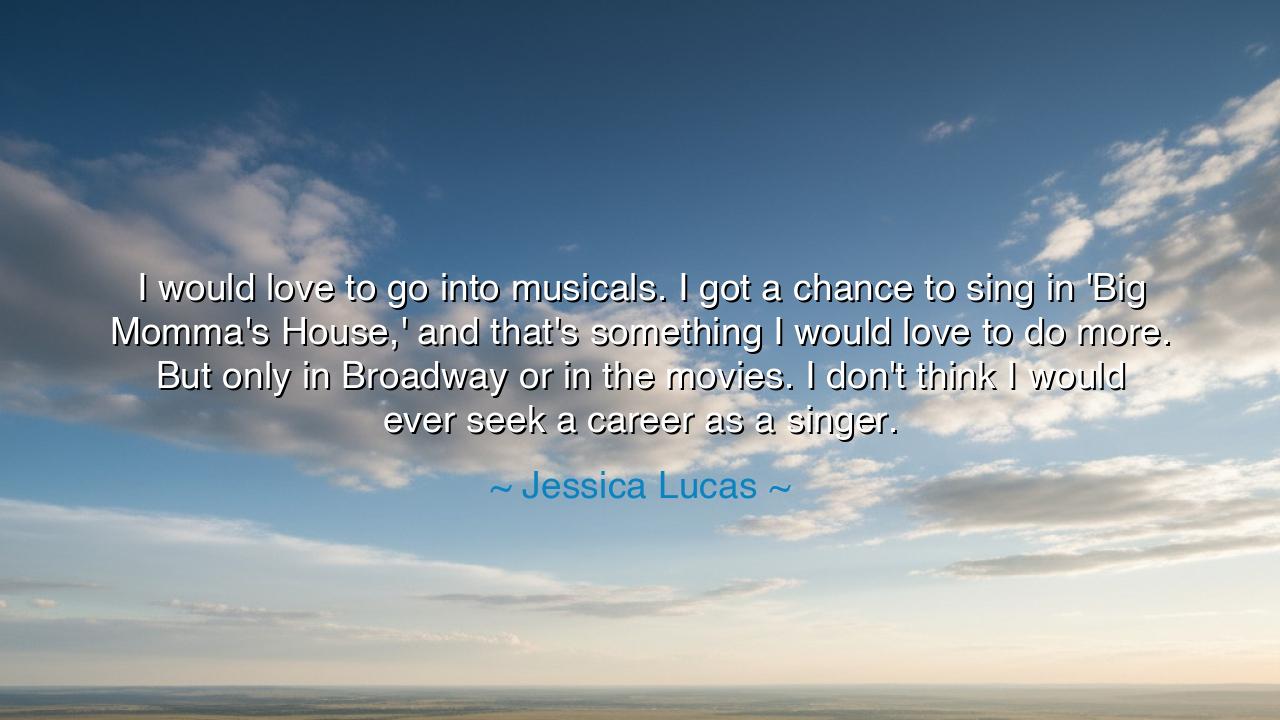
I would love to go into musicals. I got a chance to sing in 'Big
I would love to go into musicals. I got a chance to sing in 'Big Momma's House,' and that's something I would love to do more. But only in Broadway or in the movies. I don't think I would ever seek a career as a singer.






"I would love to go into musicals. I got a chance to sing in 'Big Momma's House,' and that's something I would love to do more. But only in Broadway or in the movies. I don't think I would ever seek a career as a singer." These words from Jessica Lucas reveal a deep passion for the arts, tempered by a sense of purpose and focus in her career. Lucas expresses a longing for the world of musicals and the unique opportunity to sing in a way that brings together the power of performance and storytelling. Yet, she makes a clear distinction between the joy of singing within the context of film or theater and the commitment that comes with pursuing a career solely as a singer. This duality reflects an ancient tension—the desire for expression and art, tempered by the understanding of one’s true calling and the limits of time and focus.
In the ancient world, the art of performance was often intertwined with deeper philosophical and moral purposes. In Greek theater, for example, the tragedies and comedies were more than just forms of entertainment—they were a way for the audience to engage with human nature, fate, and the gods themselves. Sophocles, Euripides, and Aeschylus used their plays to offer commentary on the world around them, to teach virtue, and to explore the eternal struggles of mankind. The idea of performance as a means of truth-seeking was not only central to their art but was a way of engaging with the greater mysteries of existence. Lucas' interest in musicals, as part of her broader passion for the arts, reflects this ancient understanding—that performance is more than just a career; it is a vehicle for self-expression and connection to something greater.
Consider the life of Aristotle, who not only explored philosophy but also wrote about tragedy and comedy in his Poetics. Aristotle understood the power of storytelling and how it could evoke deep emotions in the audience, moving them toward catharsis—a cleansing or purging of emotions. This powerful effect of performance—whether through music, drama, or dance—has always been a means of connecting deeply with the human soul. Like Lucas, who finds joy in acting and singing but recognizes the limits of a singular path, Aristotle believed that performance could enrich our lives, but that balance was needed to achieve true wisdom and purpose in life.
Lucas’ decision to not seek a full-time career as a singer mirrors the ancient wisdom of balance in one’s pursuits. In the philosophy of the Stoics, there was an emphasis on maintaining focus on what was essential, while avoiding distractions that could pull one off course. Epictetus and Seneca both wrote about the importance of staying true to one’s calling, not being swayed by the temptations of fame or fleeting pleasure, but dedicating oneself to a life of virtue and purpose. Lucas recognizes that while singing brings her joy, her true calling may lie in a more holistic approach to performance, where acting and music are part of a greater artistic expression, not the sole focus of her identity.
This balance between passion and purpose is something many artists face in their own careers. Take the life of Meryl Streep, whose versatility as an actress spans from dramatic roles to comedic performances, and even musical endeavors, as seen in Mamma Mia! Streep, like Lucas, does not restrict herself to one genre but instead pursues a broad range of expressions within the arts. However, just as Lucas draws a line between pursuing a career as a singer and engaging with music in the context of acting, Streep has remained focused on her core role as an actress while allowing for musical moments to enrich her performances. Her success is a reminder that focusing on one’s true calling, while also embracing diverse opportunities, is a way to maintain purpose while exploring creative expression.
The lesson from Lucas’ words is one of self-awareness and balance. To seek artistic expression, whether through singing, acting, or writing, requires not only passion but the wisdom to know where to direct one’s energy. Lucas’ choice to engage with musicals without committing to a singing career shows a deep understanding of her strengths and limitations. This balance between passion and purpose is a reminder for us all that it is not necessary to follow every path that presents itself, but rather to find the one that aligns most closely with our core values and gifts.
In practical terms, Lucas’ approach calls us to consider the ways in which we pursue our dreams and ambitions. Do we spread ourselves too thin, chasing every opportunity, or do we focus on those pursuits that truly allow us to flourish? Like Lucas, we must ask ourselves: How can we engage with our passions in a way that brings us joy, without losing sight of our greater purpose? Whether we are artists, businesspeople, or parents, the key to fulfillment lies in understanding our true calling, balancing our desires with our capabilities, and choosing the path that allows us to grow into the person we are meant to be.






AAdministratorAdministrator
Welcome, honored guests. Please leave a comment, we will respond soon